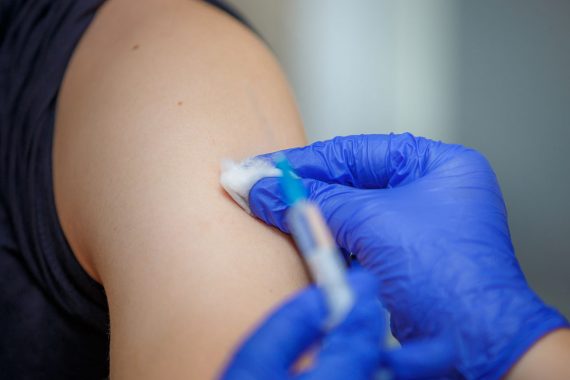GP practices cannot use DHSC flu stock for ‘temporary shortfalls’

GP practices cannot use the Government’s central flu stock to ‘plug temporary shortfalls’ and must ‘exhaust’ other supply routes first, the Department of Health and Social Care (DHSC) has said.
Practices will also be limited on the amount of stock they can order, but if they acquire too much they will have to destroy the surplus vaccines rather than using them with private patients, it added in newly released guidance.
On Friday, the DHSC announced that GPs will be able to place orders for additional flu vaccines – free of charge – from the Government’s central stock from mid-October.
But in detailed guidance sent to practices before the weekend, the DHSC said that practices should only order from the Government’s central stock ‘once their own local stocks are depleted’ and must not use it to ‘tide’ themselves over if another local delivery is possible.
The guidance also said practices can order up to 1,000 vaccines at a time, but only once every two weeks – and with a total overall order limit of 10% of their eligible patient cohort.
Meanwhile primary care networks cannot order on behalf of multiple practices, it added.
GP practices will receive a £10.06 item of service (IoS) fee for each vaccination ordered through the central stock, said the DHSC.
However, practices cannot claim an item of service fee for staff vaccinations – and the central stock should only be used to vaccinate healthcare staff ‘in exceptional circumstances’.
The DHSC reiterated that patients aged 50-64 are not yet eligible for the free flu jab and should not be vaccinated using the central stock until they become eligible.
The guidance reiterated practices must ‘exhaust’ locally procured stock before accessing the Government’s supply.
It said: ‘The MHRA has granted a dispensation to allow movement of vaccines locally between practices and other NHS provider organisations and we would encourage you to work with your regional NHSEI Public Health Commissioning team to understand what stock is available locally before accessing the national DHSC supply.’
Practices ‘may wish’ to liaise with other practices in their PCN and should only use the DHSC supply ‘when there are no other alternative options to accessing more vaccines’, it added.
Additional stock for each eligible cohort cannot be ordered until all other orders for that cohort have been ‘received and used’, the guidance said.
It said: ‘When you have allocated all of your locally procured stock – for example you have confirmed appointments and cannot take any more bookings for one or more eligible cohort – you should contact one of the four named manufacturers to place an order.
‘DHSC stock can only be used once a practice’s locally procured stock supplies have been exhausted/fully allocated and must not be used to plug temporary shortfalls in the availability of locally procured vaccines.’
It added: ‘DHSC stock is not to be used to manage temporary shortages for a particular cohort, e.g. to tide you over until you receive a further delivery of local stock from suppliers.’
The guidance added that any surplus DHSC-supplied stock should ‘under no circumstances’ be sold to a third party or used to vaccinate private patients who are not eligible to receive the flu jab under the free programme.
It said: ‘In the very unlikely circumstance that a practice finds itself with a small amount of unused DHSC stock and only after notifying your regional NHSEI Public Health Commissioning Team and making every effort to redistribute the stock, practices will be required to dispose of any unused DHSC stock themselves.’
Meanwhile, practices should only use the DHSC stock to vaccinate staff ‘in exceptional circumstances’, such as where has staff member has been off sick or is newly employed later in the season.
Additional stock is available from four suppliers to ‘mitigate the risks’ to supply if there are ‘serious problems with the delivery or manufacture of one of the products’, it added.
An update to the flu vaccination DES will be published in October to reflect the new arrangements, the DHSC said.
It comes as GPs across the country have this week warned that they have been forced to pay for their personal flu jab as their practices are ‘massively short’ of stock.
A PHE report revealed last week that GP practices in England have delivered more flu vaccinations to patients over 65 years old than they had at the same point last year – with rates higher than 2019 in all eligible groups.
Pulse October survey
Take our July 2025 survey to potentially win £1.000 worth of tokens

Visit Pulse Reference for details on 140 symptoms, including easily searchable symptoms and categories, offering you a free platform to check symptoms and receive potential diagnoses during consultations.










